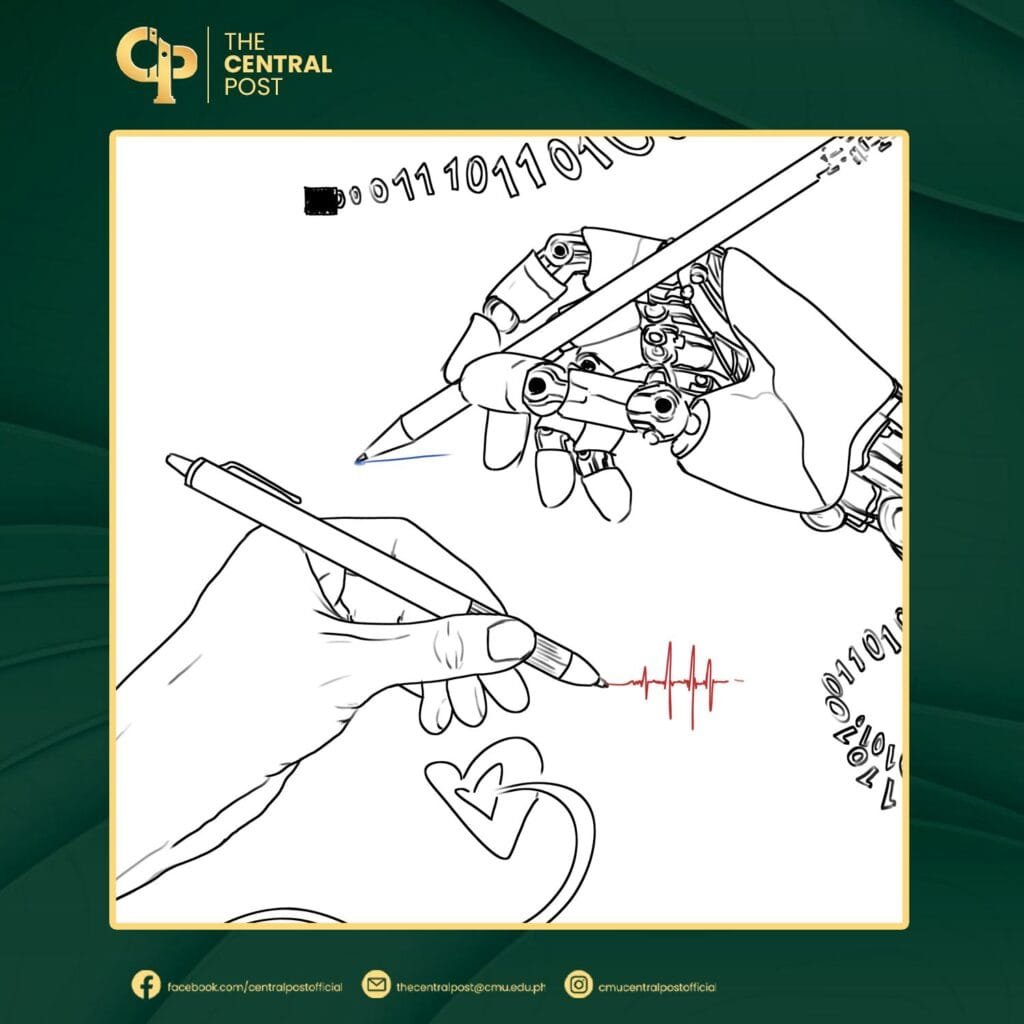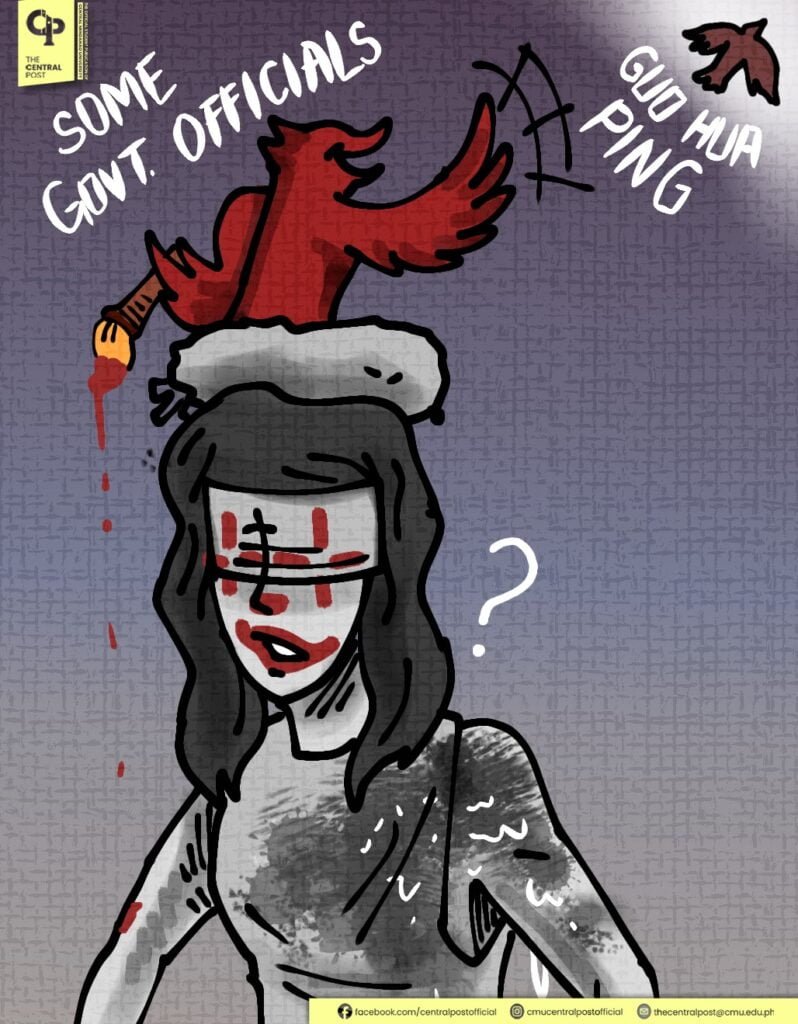𝘉𝘦𝘤𝘢𝘶𝘴𝘦 𝘵𝘩𝘦 𝘴𝘰𝘶𝘭 𝘴𝘵𝘪𝘭𝘭 𝘸𝘳𝘪𝘵𝘦𝘴 𝘸𝘩𝘢𝘵 𝘴𝘺𝘴𝘵𝘦𝘮𝘴 𝘯𝘦𝘷𝘦𝘳 𝘸𝘪𝘭𝘭.
Once, people used to marvel at words that were well written. Now, they doubt them. When a line flows too smoothly or an idea lands too perfectly, suspicion rises faster than admiration.
“AI ra na,” they say, as if skill is a sin and excellence is an impossibility.
We have reached a strange chapter in human progress: an era where brilliance must first defend its authenticity before it can be believed, where art that feels too beautiful, too composed, is assumed to be machine-made. How ironic that the same world that once demanded clarity and conviction now distrusts them the moment they appear.
According to Instructure’s 2025 State of Higher Education Report, around 63% of Filipino students now use generative AI tools such as ChatGPT for schoolwork and writing tasks. That figure is real, but it has quietly built a shadow of prejudice for the rest—the writers, and thinkers, who still choose the long, honest road of creation; those who wrestle with blank pages, with exhaustion and doubt, just to turn thought into meaning; those who write not for grades or recognition, but for release.
Yet their sincerity is often erased by a single accusation: “ChatGPT ra na.”
But writing—true writing—is not built by code. It is carved from ache and awe. It is born from moments machines will never live through: heartbreak, grief, wonder, and the quiet miracle of understanding oneself through words. A machine can arrange syllables but it cannot ache for them. It can simulate voice but not vision. Because intention is human. And intention is where creation begins.
Here lies the paradox we keep missing: AI writes only because humans first dared to. Every metaphor it mimics, every rhythm it replicates, every tone it copies—all traces back to us. It is a reflection, not a revolution. It learns because we live. So when someone says, “This sounds too good to be human,” they do not compliment technology—they insult humanity. They expose how deeply we’ve forgotten to trust in our own capacity to be extraordinary.
We used to read good writing and say, “That’s talent.” Now we say, “That’s too perfect to be real.” But excellence was never supposed to look effortless; it was supposed to look earned. We are simply uncomfortable with what we no longer strive for.
Maybe that’s the heart of it. The problem isn’t that AI is surpassing us—it’s that we’ve convinced ourselves it already has. We’ve mistaken shortcuts for skill, convenience for capability, and redefined genius into something suspicious. But not all that sounds polished is programmed; sometimes it’s just passion, persistence, and purpose woven together until they sound like perfection. Because human intellect has always been a quiet revolution. It does not beg for validation from machines; it only needs belief from others, and most of all, from ourselves.
So the next time a piece of writing moves you, don’t be so quick to call it generated.
Pause. Listen. Feel.
Find the heartbeat between the lines, the pulse beneath the punctuation. Because what makes writing human isn’t its imperfection, but in its intention. It’s the trembling certainty of someone choosing the right word over the easy one.
Machines can predict patterns, but they cannot feel the rush of relief when words finally fall into place. They cannot feel the pride of creation, nor the sting of rejection, nor the quiet joy of being understood. Only humans can.
And that is why, even in this age of automation, ink will always win over code. Because passion will always write louder than patterns. Because the soul will always speak in ways no system ever will.
This will forever be Ink Over Algorithms.
𝘞𝘳𝘪𝘵𝘦𝘳: 𝘙𝘦𝘨𝘪𝘯𝘦 𝘚𝘰𝘮𝘶𝘩𝘪𝘥
𝘊𝘰𝘱𝘺𝘳𝘦𝘢𝘥𝘦𝘳: 𝘫𝘢𝘥𝘢𝘮𝘦𝘳𝘴𝘴𝘴
𝘈𝘳𝘵𝘪𝘴𝘵: 𝘑𝘰𝘦𝘮𝘢𝘳𝘪 𝘊𝘦𝘯𝘢
𝗥𝗘𝗙𝗘𝗥𝗘𝗡𝗖𝗘𝗦
𝘊𝘢𝘭𝘢𝘣𝘳𝘦𝘴𝘦, 𝘈. (2025, 𝘍𝘦𝘣𝘳𝘶𝘢𝘳𝘺 13). 𝘙𝘪𝘴𝘪𝘯𝘨 𝘥𝘦𝘮𝘢𝘯𝘥 𝘧𝘰𝘳 𝘭𝘪𝘧𝘦𝘭𝘰𝘯𝘨 𝘭𝘦𝘢𝘳𝘯𝘪𝘯𝘨 𝘪𝘯 𝘵𝘩𝘦 𝘗𝘩𝘪𝘭𝘪𝘱𝘱𝘪𝘯𝘦𝘴 𝘩𝘪𝘨𝘩𝘭𝘪𝘨𝘩𝘵𝘴 𝘯𝘦𝘦𝘥 𝘧𝘰𝘳 𝘣𝘦𝘵𝘵𝘦𝘳 𝘦𝘥𝘶𝘤𝘢𝘵𝘪𝘰𝘯𝘢𝘭 𝘵𝘦𝘤𝘩𝘯𝘰𝘭𝘰𝘨𝘺 – 𝘐𝘯𝘴𝘵𝘳𝘶𝘤𝘵𝘶𝘳𝘦 𝘴𝘶𝘳𝘷𝘦𝘺. 𝘐𝘯𝘴𝘵𝘳𝘶𝘤𝘵𝘶𝘳𝘦. 𝘩𝘵𝘵𝘱𝘴://𝘸𝘸𝘸.𝘪𝘯𝘴𝘵𝘳𝘶𝘤𝘵𝘶𝘳𝘦.𝘤𝘰𝘮/𝘦𝘯-𝘢𝘶/𝘱𝘳𝘦𝘴𝘴-𝘳𝘦𝘭𝘦𝘢𝘴𝘦/𝘳𝘪𝘴𝘪𝘯𝘨-𝘥𝘦𝘮𝘢𝘯𝘥-𝘭𝘪𝘧𝘦𝘭𝘰𝘯𝘨-𝘭𝘦𝘢𝘳𝘯𝘪𝘯𝘨-𝘱𝘩𝘪𝘭𝘪𝘱𝘱𝘪𝘯𝘦𝘴-𝘩𝘪𝘨𝘩𝘭𝘪𝘨𝘩𝘵𝘴-𝘯𝘦𝘦𝘥-𝘣𝘦𝘵𝘵𝘦𝘳-𝘦𝘥𝘶𝘤𝘢𝘵𝘪𝘰𝘯𝘢𝘭



